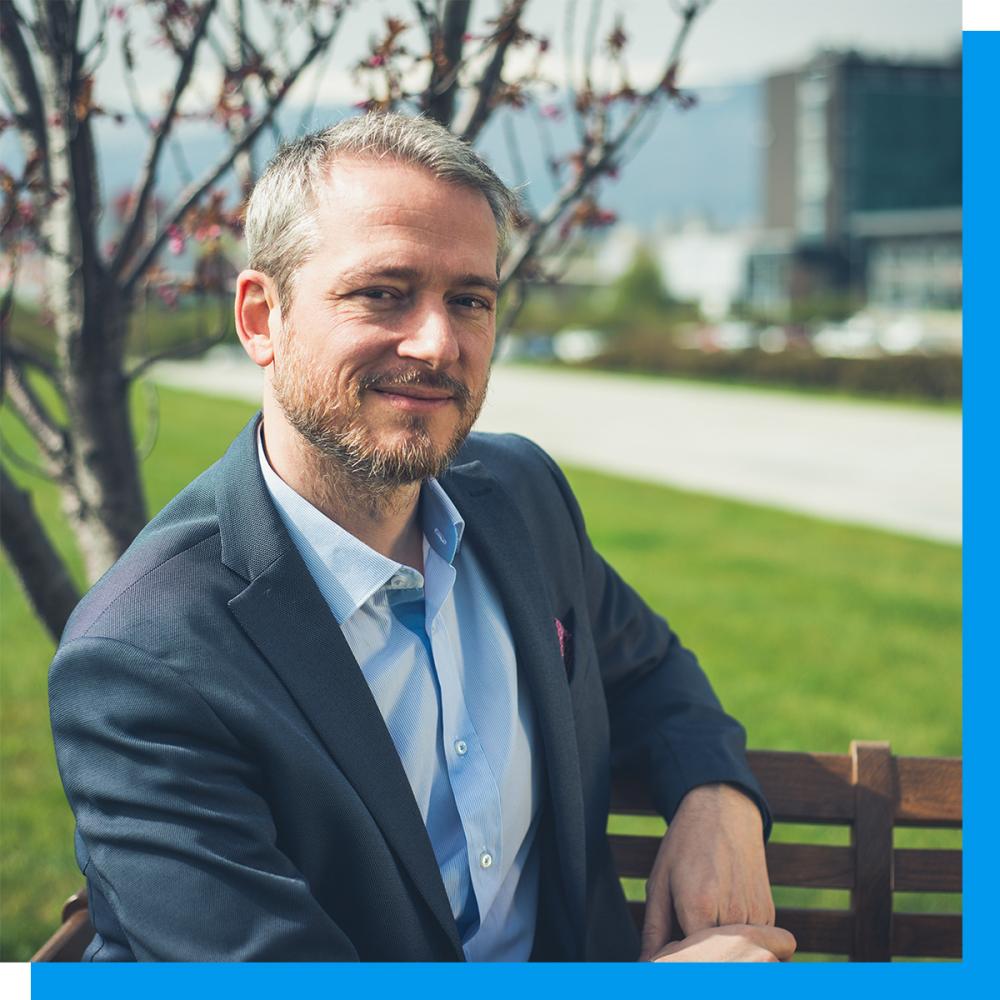Empowering Future Leaders of Climate Finance
STEPHAN PETERS
As Managing Director at the International Climate Finance Accelerator, Stephan Peters sees the climate finance space from all angles. He and his team assist aspiring climate fund managers in structuring their vehicles, formulating investment strategies, guiding operational implementation and securing financing.

“I try to use the lessons I've learned from the legacy finance space to push the impact investment side forward, make it more robust and resilient and stimulate more people to move into the sustainability field,” he says.
We caught up with Stephan to see how he does it, and why ICFA’s 2022 Cohort represents the next wave of climate finance leaders.

Can you describe ICFA’s culture?
ICFA is located in Luxembourg in the House of Startups, a sizeable building with a bunch of incubators and accelerators, a thriving and dynamic environment. We channel this energy into the accelerator programme we run. Currently we’re a team of three, and we're looking to expand the initiative over time. We want the ICFA to be a learning bed, not just for people coming in and learning what sustainable finance is and how it works. We also want to play a role in engaging with the greater financial ecosystem: financial players that are moving into the space, but also well-established impact investors and venture philanthropists who are looking to collaborate across the spectrum.
What’s your approach to partnerships?
The kind of social or environmental issues that we're trying to solve with impact investing are always bigger than one player alone. Partnerships are key to tackle these issues effectively. Collaboration helps people build more robust solutions, because you can capture multiple, different perspectives, making the ultimate solutions more resilient and more representative.
At the same time, as an ecosystem, we need to bridge this gap between the public sector, the private sector and the philanthropy field. My team and I have first-hand experience with the benefits of building these bridges, because the ICFA was created as a public-private partnership: we receive funding from the Luxembourg government – they keep the lights on – but they also provide us with valuable insights and support from the policy side, while our private partners contribute experience, knowledge and training. All these parties lend their credibility to our initiative and that credibility, that knowledge, that expertise, allows the ICFA to be the nexus of a vibrant ecosystem around climate finance in Luxembourg and beyond.
If you’re a climate fund manager, being part of the ICFA Cohort is a major step for validation and credibility. What does 2022’s cohort look like?
This year’s cohort is a very diverse group. We've got Energy Peace Partners based in the US, looking at the most climate-vulnerable, fragile states and conflict areas; they create energy access and generate a peace dividend in those countries and regions. There’s Katapult, based in Norway, who’s looking at high-impact venture-tech types of investments into ocean and climate. We've got Olduvai Capital, supporting companies in East Africa with their energy transition, and Incofin Investment Management addressing sustainable agri-food value chains, climate adaptation and biodiversity in Latin America. These cohort members, together with previous cohorts, are from all over the world and they represent a wide range of investment strategies. The only common denominator I see in this year’s cohort is that they are all emerging fund managers, as in they're looking to set up their first fund, and they're all working on solving climate change.
Several of this year’s cohort members are focused on Sub-Saharan Africa. Can you illustrate the importance of solving climate challenges for this region?
Climate change is a global phenomenon. Due to the rapid effects of climate change, many parts of Sub-Saharan Africa may become uninhabitable due to multi-year droughts and other climate effects, impacting food security, increasing conflicts and poverty, affecting human health and ultimately even the structure of their communities. In Europe, we can expect an influx of climate refugees seeking shelter and safety from these disastrous effects. Without strong, immediate action to combat climate change, we are going to see major impacts across the globe, on the environment and on the social structure of our societies.
That’s a perfect example of how social and environmental challenges are connected. What about connected solutions?
Quite a few of our fund managers do exactly this. It’s difficult to address climate action meaningfully over the long term without also addressing social issues. Let's say you're looking to do a reforestation project. You need to work with the local community to explain how a healthy forest will provide them livelihoods and a way to preserve their culture, instead of chopping it down and putting extractive agriculture there. If you're thinking about solar energy plants in Africa, you don't want to fly in the expats and run the project in a guarded bubble. You want to build locally and work with the communities to upskill their youth and provide dignified jobs to them. It can be easy to get locked into a binary trade-off between the environmental and the social. Once you dig deeper into the ecosystem around your project, you understand that it's simply impractical not to do both at the same time.
ICFA is a community builder for climate fund managers. What creates cohesion in this community?
Cohesion is created by the mutual goal of these fund managers to launch their funds. To launch a fund, you need to have many skills – fund management, risk management, structuring, due diligence, impact measurement and management, distribution, pitching, regulations and fundraising.
We bring a big pool of applicants together to train them on these topics and, as they progress through our selection process, the group becomes smaller but also more interactive. Once selected for support by the ICFA, our cohort members have gained a solid understanding of each other’s strategies and they have started to help each other by sharing their own experience and insights. This builds a strong foundation for peer learning afterward that we continue to facilitate. For instance, we would propose: ‘One of you is advanced with their impact measurement and management framework. Why don't you present how you approached it? How did you come to your conclusions? What KPIs did you choose and why?’
This approach creates meaningful exchanges and taps into the informal knowledge that you don't get from following a course or reading a book. Past cohort members are still talking regularly with each other because they hit it off at one of our speaking events or conferences, or because they're in the same region or sector; they may have a different strategy, but they love engaging and working together.
You mentioned KPIs and measurements. Which frameworks for impact measurement and management are most useful among the cohort?
There's no real one-size-fits-all. You see different frameworks come forward because they're more typically used in that specific area or that specific SDG, but you also see certain things returning. IRIS+ is often a baseline for finding KPIs, and then they often tie them into a bigger framework like PCAF, SASB or the Joint Impact Model. At the end of the day, it's a challenge for small funds, especially if they work in the emerging markets to have a wide set of portfolio KPIs and then ask their portfolio companies or projects to report as widely. There's always a balance between proper reporting with the right proxies or the right KPIs, and measurement needs to be fit to scale for the beneficiaries.
Can you give some insights about the cohort selection process that don’t appear in the official criteria? What do you look for in a team?
When assessing emerging fund managers, the team carries even more weight than in a typical fund screening process. We look for experience working together, directly or indirectly. We look to understand whether they’ve understood the implications to launch a fund beyond the business plan they submit to us. The team needs to be aligned around their vision and understand each other’s strengths and how they contribute to the whole. Setting up a fund is a long-term commitment. That's why team dynamics are a key aspect to understand for us.
What are some of the latest trends and developments in the climate finance space?
There's a clear momentum over the last couple of years around climate. Members of the younger generation are speaking their minds, going into advocacy roles and putting pressure on the world leaders to act. Policymakers have taken note by establishing more targeted, better policies around climate action in place. Professionals are leaving their traditional roles and pursue career changes into sustainability.
While it is good to see the momentum building, it’s not fast enough as highlighted by the most recent IPCC report.
We need to transform this momentum into further action. Companies need to stop past destructive practices and pivot their business models to offer products and services to support the energy transition and build not just a circular economy, but a regenerative one. And we need to see more capital flow to address climate change.
There’s still a lot to be done, but there seems to be a shift in the way that people finally recognize there are profitable opportunities in sustainability. Just look at the energy transition: we know where we need to go given the energy prices today and the climate impacts that are affecting the world. The companies and investors who are frontrunning to help decarbonize our economy will become leaders in their fields, leaving those that are dragging their feet behind. That’s effectively what the ICFA is also stimulating: we are not just creating the future leaders of climate finance, but of the future financial system.
For more information on ICFA, including a call for expression of interest in the 2023 cohort, please visit their website.

